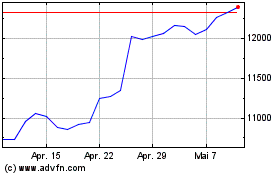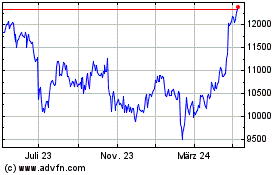AstraZeneca Applies for European Clearance of Covid-19 Vaccine
12 Januar 2021 - 12:50PM
Dow Jones News
By Jenny Strasburg
LONDON -- AstraZeneca PLC has applied for emergency-use
authorization in Europe of the Covid-19 vaccine it developed with
the University of Oxford, a step toward the rollout of more shots
across the region as infections and hospitalizations rise.
The European Union's drug regulator said Tuesday it could
authorize the vaccine as soon as Jan. 29 after completing a review
of clinical-trial data. The European Medicines Agency's key
scientific committee will meet that day after additional analysis
of the trial results and safety and manufacturing data. Any
recommendation to green light the vaccine would likely be
formalized by the European Commission within a day or two.
That timeline eventually could add 400 million doses to Europe's
vaccine arsenal as the region battles a deadly winter surge of the
virus, exacerbated by the spread of a variant first discovered in
the U.K. The EU has preordered 300 million doses of the
Oxford-AstraZeneca vaccine, with an option for 100 million
more.
Last week, Europe cleared a vaccine developed by Moderna Inc.
for emergency use, giving the region a second Covid-19 shot. The
bloc is struggling to distribute the doses it has, after
authorizing a vaccine from Pfizer Inc. and German partner BioNTech
SE in December.
Distribution across 27 member states has been hurt by logistical
bottlenecks and challenges with ultracold storage requirements that
complicate widespread distribution. Some governments in Europe
early on were expecting the Oxford-AstraZeneca vaccine to be first
to market, leaving them unprepared for the freezer logistics of the
Pfizer-BioNTech shot, resulting in slow, uneven rollouts.
The Oxford-AstraZeneca vaccine requires only normal
refrigeration for both short- and longer-term storage and
distribution. AstraZeneca has promised to make as many as three
billion doses available in 2021 -- more than any other Covid-19
vaccine maker -- and at a cheaper price. The U.K. company says it
won't profit from the shot during the pandemic.
Like the other two vaccines, it is intended to be administered
in two doses, in its case roughly one month apart. Some countries
led by the U.K. have opted to delay second doses to get more first
shots to vulnerable people more quickly.
The EMA so far has advised countries to stick to original dosing
schedules, though some countries such as Belgium, Germany and
Denmark have discussed or adopted longer intervals to stretch the
supply of doses.
The Oxford-AstraZeneca vaccine was authorized for emergency use
by the U.K. first, in late December. In early January, India
cleared the vaccine for use.
AstraZeneca has a manufacturing and distribution agreement with
the Serum Institute of India to provide more than one billion doses
to developing countries.
The vaccine's efficacy against symptomatic Covid-19 ranged from
62% to 90% in late-stage clinical trials, with most trial results
in the lower end of that range. The shots made by Moderna and
Pfizer-BioNTech were more than 90% effective. But U.K. authorities
have said the results are difficult to compare because of the
different technologies behind the vaccines and the complexities
particular to the clinical trials of the Oxford-AstraZeneca
shot.
The U.K.'s medicines regulator has said the Oxford-AstraZeneca
vaccine is about 70% effective at three weeks after the first dose
and stretching to the time of the second dose, even if that is
around about 12 weeks later.
Write to Jenny Strasburg at jenny.strasburg@wsj.com
(END) Dow Jones Newswires
January 12, 2021 06:35 ET (11:35 GMT)
Copyright (c) 2021 Dow Jones & Company, Inc.
Astrazeneca (LSE:AZN)
Historical Stock Chart
Von Mär 2024 bis Apr 2024

Astrazeneca (LSE:AZN)
Historical Stock Chart
Von Apr 2023 bis Apr 2024
